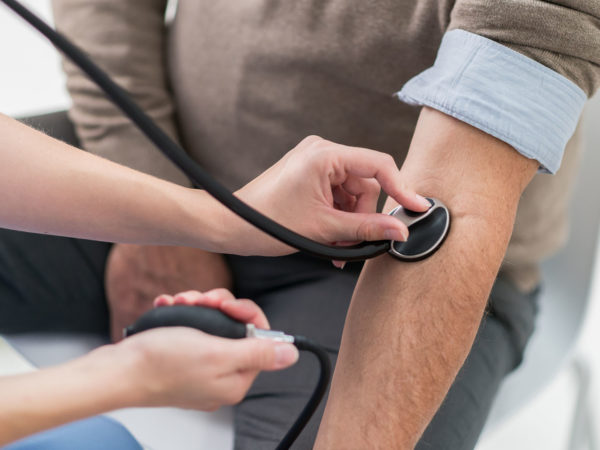Too Young For High Blood Pressure?
I just learned that a good friend, age 37, has high blood pressure. What does that mean for his future health? And what can he do to reduce any risks?
Andrew Weil, M.D. | January 25, 2019

Your question is timely. Two studies published in November 2018 addressed the issue of the health risks posed by high blood pressure in people under 40. Both concluded that those affected face significant risks of premature heart disease, heart attack and stroke. High blood pressure is the most common risk factor for cardiovascular disease. Contributing to it are excessive salt consumption (and consequent water retention), stress, deficiencies of calcium, magnesium and potassium, as well as insulin resistance, kidney disease, excessive alcohol intake, being overweight and taking certain medications.
One of the two studies, from Duke University, revealed that among 4,851 young Americans, about half white and half black, average age 36, high blood pressure presented a risk of heart disease and stroke up to 3.5 times higher than in those of the same age with normal blood pressure. About half the study participants had normal blood pressure – 120/80 or lower. The higher an individual’s blood pressure at the study’s start, the higher the risk of cardiovascular problems during 19 years of follow up. Those whose pressure was between 120-129/80 or higher had a 67 percent higher risk of cardiovascular problems. Those whose pressure ranged from 130-139/80-89 had a 75 percent higher risk and those whose blood pressure was even higher were 3.5 times as likely to develop cardiovascular disease of some sort. Overall, some 230 of the study participants had a heart attack, stroke or heart failure during the 19 years.
The other study, from Korea, was based on data from 2.5 million young adults, age 20 to 39, whose blood pressure was taken over four years and were then followed for another 10 years. During that time some 45,000 cardiovascular events occurred among the study participants. Those with hypertension had an up to 85 percent increased risk of premature heart disease and stroke compared to participants whose blood pressure was normal. The risk of heart disease or stroke among those with Stage-one hypertension was about 25 percent higher than those with normal blood pressure; with Stage-two high blood pressure the risks were 76 percent higher among men and 85 percent higher in women.
Both studies defined high blood pressure based on guidelines from the American College of Cardiology and the American Heart Association introduced in 2017. These define normal blood pressure as 120/80 or less. Blood pressure that reaches 130-139/81-89 is considered Stage-1 high blood pressure; Stage-2 is pressure at or above 140/90.
Under the new guidelines, some 46 percent of Americans are considered to have high blood pressure, a big increase over 32 percent under earlier guidelines. We don’t know yet whether those under 40 with hypertension would benefit from taking medication – we need a randomized, controlled trial to determine if drug treatment can help. Duke study leader Yuichiro Yano, M.D., Ph.D., recommends that those under 40 with high blood pressure make an effort to control their weight, if necessary, and pursue other heart-healthy measures.
Andrew Weil, M.D.
Sources:
Yuichiro Yano et al, “Association of Blood Pressure Classification in Young Adults Using the 2017 American College of Cardiology/American Heart Association Blood Pressure Guideline With Cardiovascular Events Later in Life.” JAMA, November 6, 2018, doi:10.1001/jama.2018.13551
Sang Min Park et al, “Association of Blood Pressure Classification in Korean Young Adults According to the 2017 American College of Cardiology/American Heart Association Guidelines With Subsequent Cardiovascular Disease Events.” JAMA, November 6, 2018, doi: 10.1001/jama.2018.16501












